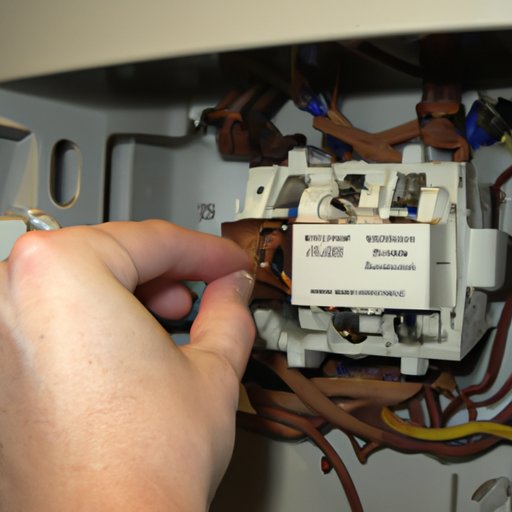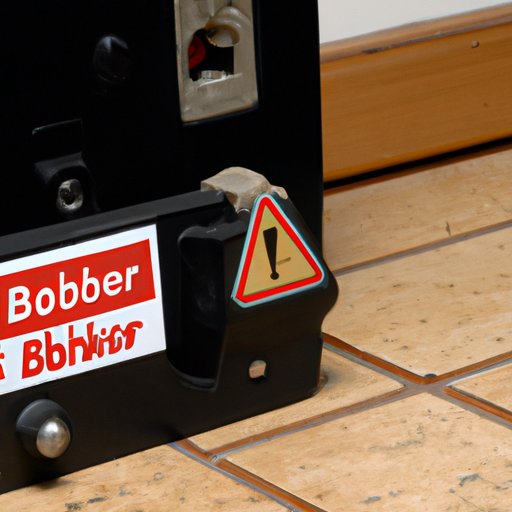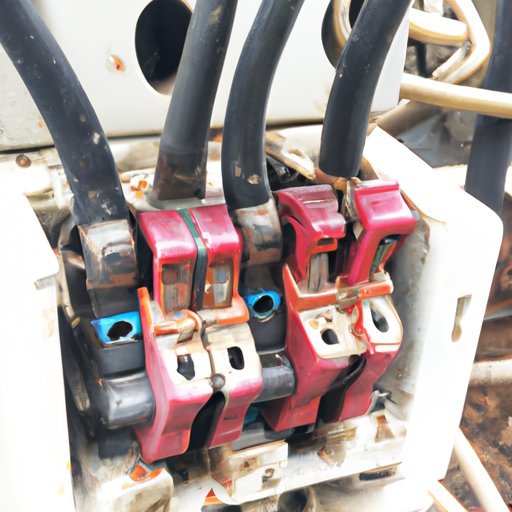Introduction
When a breaker trips, it means that the circuit has been overloaded with too much electricity, which is then interrupted by the breaker. This can be caused by a variety of things, such as a short circuit, an electrical overload, or a ground fault interruption. In this article, we will explore what it means when a breaker keeps tripping and how to prevent it from happening in the future.
Exploring the Causes of a Breaker Tripping
The most common causes of a breaker tripping are electrical overload, short circuits, and ground fault interruptions.
Electrical Overload
An electrical overload occurs when too much electricity is running through one circuit. This can happen if too many appliances are plugged into one outlet or if one appliance draws more electricity than its rated capacity. When this happens, the breaker will trip to protect the wiring from overheating and potentially causing a fire.
Short Circuit
A short circuit occurs when two wires of different voltage levels come into contact with each other. This causes a surge of electricity to run through the circuit, which can damage wiring and cause a fire. The breaker will trip to prevent this from happening.
Ground Fault Interruption
A ground fault interruption (GFI) is a safety device that trips when it detects an imbalance in the electrical current in the circuit. This can happen if there is a fault in the wiring, or if something is plugged into an outlet that is not properly grounded. The GFI will trip to prevent shocks or fires.
How to Prevent Breakers from Tripping
There are several ways to prevent breakers from tripping due to electrical overloads, short circuits, or ground fault interruptions.
Upgrade Your Wiring
If your home’s wiring is outdated or inadequate for the amount of electricity you’re using, it may be time to upgrade your wiring. An electrician can inspect your home’s wiring and make sure that it is up to code and able to handle the amount of electricity you’re using.
Use Surge Protectors
Surge protectors can help protect your electronics from power surges that can cause breakers to trip. They can also help protect your electronics from lightning strikes, power outages, and other issues that can cause breakers to trip.
Don’t Overload Outlets
It’s important to not overload outlets with too many appliances. Each outlet can only handle so much electricity, and if too many appliances are plugged in, it can cause the breaker to trip. Make sure to spread out your electronics and use multiple outlets instead of plugging them all into one outlet.

Troubleshooting Tips for a Breaker That Keeps Tripping
If your breaker is continually tripping, there could be an underlying issue that needs to be addressed. Here are some troubleshooting tips to help you find and fix the issue.
Check for Loose Connections
Loose connections can cause breakers to trip. Check all the connections in the circuit panel to make sure they are tight and secure. If any of the connections are loose, tighten them up before resetting the breaker.
Inspect the Breaker Itself
The breaker itself can become worn out over time due to constant use. Inspect the breaker to make sure it is in good condition and not damaged in any way. If the breaker is damaged, it should be replaced as soon as possible.
Check the Circuit Panel
The circuit panel could be the source of the problem. Check the circuit panel for signs of corrosion, rust, or other damage. If the panel is damaged, it should be replaced as soon as possible to prevent further problems.

A Guide to Understanding Why Breakers Trip
Understanding why breakers trip can help you prevent them from tripping in the future. Here are some tips to help you understand why breakers trip.
Know Your Home’s Electrical System
Knowing the layout of your home’s electrical system can help you identify potential problems before they occur. Knowing where all the outlets and breakers are located can help you avoid overloading any one circuit.
Learn About the Different Types of Breakers
Different types of breakers are designed to handle different amounts of electricity. Learning about the different types of breakers and their ratings can help you choose the right one for your home’s electrical system.
Understand the Difference Between GFCIs and AFCIs
Ground fault circuit interrupters (GFCIs) and arc fault circuit interrupters (AFCIs) are two types of breakers that are designed to protect against specific electrical hazards. Understanding the differences between these two types of breakers can help you choose the right one for your home’s electrical system.

What to Do if Your Breaker Keeps Tripping
If your breaker keeps tripping, there are several steps you can take to try to fix the problem.
Contact an Electrician
If you suspect that there is an underlying problem with your home’s electrical system, it’s best to contact an electrician. An electrician can inspect your home’s electrical system and make any necessary repairs to prevent further problems.
Reset the Breaker
If the breaker has tripped, you can reset it by flipping the switch back on. However, if the breaker keeps tripping, it could indicate a deeper problem that needs to be addressed.
Replace the Breaker
If the breaker is old or damaged, it may need to be replaced. Make sure to consult an electrician before attempting to replace the breaker yourself.

Safety Concerns with a Breaker That Keeps Tripping
Working on electrical systems can be dangerous, so it’s important to take certain safety precautions when dealing with a breaker that keeps tripping.
Do Not Touch Exposed Wires
Never touch exposed wires or outlets. Even if the breaker has been turned off, there could still be electricity running through the wires. Wear protective gear and unplug appliances before working on wiring.
Wear Protective Gear
It’s important to wear protective gear when working on electrical systems. This includes gloves, goggles, and other protective clothing.
Unplug Appliances Before Working on Wiring
Make sure to unplug any appliances before working on wiring. This will help prevent shocks or fires from occurring.
Common Reasons Why Breakers Trip
Understanding the most common reasons why breakers trip can help you prevent them from tripping in the future.
Overloaded Circuits
As mentioned earlier, overloaded circuits can cause breakers to trip. This can happen if too many appliances are plugged into one outlet or if one appliance draws more electricity than its rated capacity.
Short Circuits
Short circuits can cause breakers to trip as well. A short circuit occurs when two wires of different voltage levels come into contact with each other. This can cause a surge of electricity to run through the circuit, which can damage wiring and cause a fire.
Ground Faults
Ground faults can also cause breakers to trip. Ground fault circuit interrupters (GFCIs) detect an imbalance in the electrical current in the circuit and trip to prevent shocks or fires from occurring.
Conclusion
A breaker tripping can be caused by a variety of things, such as an electrical overload, a short circuit, or a ground fault interruption. To prevent breakers from tripping, it’s important to upgrade your wiring, use surge protectors, and don’t overload outlets. If your breaker keeps tripping, it could indicate an underlying problem that needs to be addressed. Make sure to contact an electrician and take safety precautions when dealing with a breaker that keeps tripping. Understanding the common reasons why breakers trip can help you prevent them from tripping in the future.
(Note: Is this article not meeting your expectations? Do you have knowledge or insights to share? Unlock new opportunities and expand your reach by joining our authors team. Click Registration to join us and share your expertise with our readers.)
